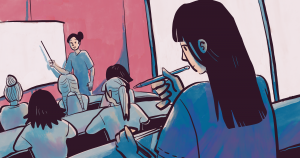Conventional, albeit misguided, wisdom tells us, “Choose a job you love, and you will never have to work a day in your life.”
No thanks to existing narratives about what passion looks like, an increasing number of youth are making it their life’s mission to discover an interest or hobby that they can turn into a career. Among millennials at least, according to Singapore Management University lecturer Paul Lim, the original 5Cs have been “supplanted by a broader definition of success and well-being”.
Until we find something we’re passionate about, we feel doomed to a life aimlessly trying not to be another CBD drone, as though there’s anything wrong with being one.
The notion that it’s paramount to pursue our passion has been implanted in our heads from young.
I know this first hand, having conducted career workshops for secondary school students in my spare time. Most of these students tend to be unsure about what they want to be when they grow up, or even what they’re good at or interested in. Still, they tell me that when they eventually find their “passion”, whether it’s math, biology, writing, or art, they hope to pursue it professionally.
As their career mentor, I am obliged to encourage their pursuits, whatever they are.
Yet when to comes to advising these students, most on the precipice of making decisions about subject combinations or where to head to after their O Levels, I try to give them a reality check—something I wish I’d gotten when I was a teenager.
I tell them not to pursue their passion.

Fresh out of university, I landed a job writing for a magazine, which had been my dream since 17. I naively assumed I would remain in the industry for a very, very long time. In the end I left after slightly over a year, jaded but enlightened.
During those 15 months at my first job, I discovered that I wasn’t content with just writing. I wanted to write about social issues, not makeup (although the latter holds a different kind of significance); I wanted to give a voice to ordinary people, not amplify the soapbox public figures already stand on. I was writing, yes. But the type of writing I was paid to do felt hollow and unimportant.
When I was thinking about what to do with my life, I blindly settled on writing, simply because it made me happy. I did not understand the nuances of that decision, or that ‘doing what you love’ does not automatically make life easier.
In fact, turning one’s passion into a career can be a surefire way to become disillusioned, because we inevitably realise that getting to do what we love and are good at doesn’t mean we’ll be rewarded for it. Doing what we love can create a sense of disconnect between how much we get paid and how much we think we deserve to get paid.
This happens because passion usually means we go above and beyond for our jobs. We put in extra hours, we take initiative, and we try to put our work before ourselves. In turn, many of us reach a point where we feel we don’t get paid enough for the effort we put in, even though we know that we do it willingly.
Whatever our passion, it doesn’t exist in a vacuum. Its value and relevance are largely determined by the economy and its place in society.
Eventually, the pressure of expecting our passion to pay off can make you resent what you loved in the first place.
Getting to the heart of your passion begins with not mistaking happiness for fulfilment.
Of course, our career shouldn’t make us dread getting out of bed. Yet many have found satisfaction doing something that “pays the bills”, simply by making an effort to see the fun and enjoyment within the parameters of said job. Outside of work, they continue to pursue their passions.
It also helps to remember that we don’t need to pursue our passion in ways that society teaches us, nor narrowly define the sort of occupations that our passions lead to. For instance, just because I liked to write, it didn’t mean I needed to be a journalist or writer.
During my stint in magazines, I often wondered if I would have felt more fulfilled if I’d pursued a different path.
In a bid to buy myself time to figure out why I do what I love, I became a public servant. I continued to write and come up with creative campaigns, and in the process, I was able to see how my passion for writing and creative work could be used for more than my own self-satisfaction. It was only in the public service that I managed to pinpoint the fundamental belief that has always guided my passion: effective communication must always be empathetic.
Even after leaving the service, this clear purpose still grounds me in both my professional and personal life, helping me to connect with whoever I meet. Till today, why I write and how I get to do it remain more important than just being able to write.

Because happiness without meaning can feel empty, it’s important to be able to tell the difference early on, and be aware of what we’re willing to put up with. To prevent waking up with a quarter or mid life crisis one day, we must do more than just figure out what we love and whether we are good at it.
We must figure out why we want to pursue our passion, whether for new knowledge, to expand our perspectives of the world and its cultures, to achieve a sense of accomplishment from picking up new skills and honing existing ones, or for the simple betterment of society. Once we are certain why we want to do what we love, we start to realise there is more than one way to do it.
In other words, for passion to be sustainable, the goal is to shift the focus from specific careers to the greater outcome we hope to achieve for ourselves or for others.
When we are able to do that, we’ll finally see the value of every passion, no matter its place in society.
Reality may be a bitter pill to swallow, but better to anticipate the smack of the cold ground than be blindsided and tumble off a cliff, before spending years trying to mend a broken spirit—all this could’ve been avoided by developing peripheral vision in the first place.
Arguably, I would not have been able to arrive at this hard won conclusion if I hadn’t been through everything I did. And so, if I had to go back in time and give my teenage self some career advice, I’d tell her exactly what I used to tell the secondary school students whom I mentored.
Don’t pursue your passion.
Pursue a purpose. And if you must, use your passion to help you get there.
Have something to say about this story? Write in: grace@ricemedia.co.








